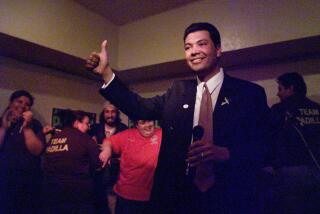Sandinista Backers Here Still Are Loyal : Nicaragua: Supporters of the ousted party in the Southland refuse to call it quits. Some are shifting their attention to other needs of the country, while others intend to act as ‘watchdogs.’
- Share via
As Nicaragua’s Sandinista government officially came to an end Wednesday, its Southern California-based sympathizers were refusing to call it quits.
For those who remain loyal to la revolucion , the initial shock at the Sandinistas’ loss in elections two months ago has now been replaced by a sad resignation and a new resolve to find ways to carry on their work in Nicaragua.
A Topanga-based group that has built homes and schools in Nicaragua for the last six years will shift its attention to towns that voted for the Sandinistas. A Los Angeles organization that ushers “fact-finding” delegations to Managua will take on a mission, serving as “watchdogs” of the pro-American government of Violeta Barrios de Chamorro.
Some activists said they remain afraid of what the U.S.-backed Contra rebels, most of whom have not yet disarmed, will do. Still other groups report interest in Nicaragua is waning.
Los Angeles has a relatively small Nicaraguan community, made up of those who supported the Sandinista government and those who fled it. Despite the small size of the community, Los Angeles--fueled in part by the money and influence of the Hollywood crowd--has served as a major center for political activism dedicated to fighting U.S. government policy in Nicaragua.
Thousands of Sandinista supporters from the United States and Europe have made regular pilgrimages to Nicaragua over the years. Whether they have a future in the new Nicaragua remains a question.
Many of the hundreds of pro-Sandinista activists who live in Southern California “had tied up their entire identity” with the Sandinista cause, said Lydia Brazon, an activist who works for a Hollywood advertising agency. They took the loss personally, she said.
“The solidarity (movement) will have to readjust to the reality that exists down there now,” Brazon added. “Everything will be more difficult, no doubt, but to what degree, we don’t know yet.”
Many Sandinista supporters, taking their cues from the Sandinista Front itself, have found ways to explain the dramatic and decisive loss of former President Daniel Ortega to Chamorro. They blame nearly 10 years of economic and military pressure from the U.S. government for turning voters against the Sandinistas.
“The people voted with a gun to their head,” said Blase Bonpane, who heads the Office of Americas, a Los Angeles-based organization that opposes U.S. policies in Central America. “They thought, ‘How do you end the war?’ You vote for Bush’s candidate.”
Bonpane’s organization shepherds delegations to Nicaragua regularly and will continue to do so, he said. Now, however, their task will be to “balance” the right-wing forces among Chamorro’s supporters and safeguard Sandinista programs in health, education and land reform if the new government tries to dismantle them.
Stephen Kerpen, director of Architects and Planners in Support of Nicaragua, said his Topanga-based organization, which started building houses and other projects in Nicaragua in 1984, will not work with the new government. Instead, the group is turning to new foundations set up by Sandinistas and planning projects for towns, such as the city of Leon, that the Sandinista Front carried in the election.
Kerpen said he does not believe that the new government has the interests of Nicaragua’s poor at heart. He spoke by telephone from Managua as he and associates watched Chamorro’s inauguration on television Wednesday.
“It’s hard,” Kerpen said. “You sort of hide behind the intellectual event and keep working.”
Witness for Peace, a national organization that monitored the Contras, plans to continue working in Nicaragua to document whether the rebels demobilize and how future installments of U.S. aid are handled. But, said Donald Kagan, director of the Los Angeles regional office, it is getting tougher to get people interested in going to Nicaragua.
Kagan said several delegations from other parts of the country have been canceled; the next group from Los Angeles is scheduled to go down in August. Without a revolution to watch, people are less interested, he said.
“I think you’ll see a shift in interest to Guatemala and El Salvador in the solidarity movement as a whole,” he said.
More to Read
Sign up for Essential California
The most important California stories and recommendations in your inbox every morning.
You may occasionally receive promotional content from the Los Angeles Times.














